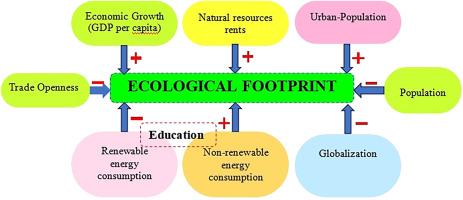Linking energy consumption to ecological footprint in sub-Saharan Africa with education as a moderator
IF 3.6
引用次数: 0
Abstract
Low levels of environmental education, energy consumption, and other anthropogenic factors strongly contribute to the rising temperature in the world's atmosphere. As such, this study reveals how energy consumption and education affect the ecological footprint (EF) and also determines the education thresholds for EF sustainability in sub-Saharan Africa (SSA). The estimation methods in this study are strictly second-generation econometric techniques because of the problems of slope heterogeneity and cross-sectional dependence discovered in the preliminary analysis. The results confirm cointegration, warranting the need for long-run parameter estimators. The Augment Mean Group estimator suggests that natural resources, non-renewable energy consumption (NRE), and economic growth increase the EF. Although renewable energy consumption (REN) and globalization reduce the EF, these indicators are insignificant. The results of the Method of Moment Quantile Regression (MMQR) reveal that REN exacts an indirect effect on the EF via education. Furthermore, the education thresholds required for ecological sustainability have been established. In line with these outcomes, it is proposed that the region redesign its energy policy to encourage eco-friendly consumption by leaning more on pro-environmental strategies and tightening environmental regulations.

将撒哈拉以南非洲的能源消耗与生态足迹联系起来,并以教育作为调节因素
环境教育水平低、能源消耗和其他人为因素在很大程度上导致了全球大气温度的上升。因此,本研究揭示了能源消耗和教育如何影响生态足迹(EF),并确定了撒哈拉以南非洲(SSA)生态足迹可持续性的教育阈值。由于在初步分析中发现了斜率异质性和横截面依赖性问题,本研究的估算方法严格采用第二代计量经济学技术。研究结果证实了协整关系,因此有必要使用长期参数估计器。增量均值组估计器表明,自然资源、不可再生能源消费(NRE)和经济增长会增加 EF。虽然可再生能源消费(REN)和全球化降低了 EF,但这些指标并不显著。矩量回归法(MMQR)的结果表明,可再生能源消费通过教育对能源效率产生间接影响。此外,还确定了生态可持续性所需的教育阈值。根据这些结果,建议该地区重新制定能源政策,通过更多倚重环保战略和收紧环境法规来鼓励生态友好型消费。
本文章由计算机程序翻译,如有差异,请以英文原文为准。
求助全文
约1分钟内获得全文
求助全文

 求助内容:
求助内容: 应助结果提醒方式:
应助结果提醒方式:


